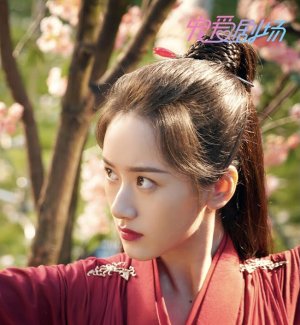Historical Genre at its Finest
The Long Ballad is easily one of the best historical dramas. Loosely based on Li Shimin’s rise to power, the story follows fictional Princess Li Changge’s banishment from the capital. After the Xuanwu Gate incident (real historical event), she loses her parents and regality. To avenge her family and reclaim power, she embarks on an arduous journey. Along the way, she encounters issues that threaten the welfare of her people. She plunges into an endless series of military operations and political maneuvers. In the show, Changge remarks that “by saving others, I am saving myself”.
Li Changge’s development is what makes the show so valuable to watch. Through her decision-making skills and profound leadership, she becomes an extraordinarily endearing main character. Changge is played by Dilraba Dilmurat, who perfectly portrays the exiled princess. Additionally, the male lead Wu Lei makes a lasting impression as ASun, the steadfast Tegin. Other amazing characters include Sher, Hao Du, Li Shimin, Du Ruhui, and Princess Yicheng.
The relationships in this drama is best described as refreshing. Unlike other shows, there are no misunderstandings that drag on forever. Changge and ASun may not be the cliche “romantic” couple, but the mature dynamic matches their personalities. The scenes between parent-child and mentor-mentee are incredibly heartwarming. Some noteworthy examples are Changge and Li Shimin, ASun and Yanli, Sher and Yicheng, Hao Du and Du Ruhui. I even find the relationship between Changge and Yicheng to be very interesting as the two characters mirror one another.
While I have heavily enjoyed watching The Long Ballad, there are some flaws. I am not a fan of Mimi Guli and wish that her character could have less screentime. The manga drawings are okay but a bit comical at times. I appreciate the mature relationship between Changge and ASun but would prefer some more romantic scenes between the two. However, these issues are minor. I still give the show a high rating because of the life lessons learned from Changge’s pivotal adventure.
Lastly, I want to give a special shout-out to the amazing OST. The music team has produced an epically beautiful selection of songs. Zhang Bicheng’s “Direction of the Light” resembles a battle song but surprisingly can serve as a healing instrumental for some scenes. Liu Yuning’s “One Love as Always” nicely complements his scenes with Zhao Lusi. Zhou Shen’s Cocoon is my favorite ballad of this year. The song can represent Changge’s emotional turmoil, her unwavering love for ASun, or her hope for eternal peace.
Li Changge’s development is what makes the show so valuable to watch. Through her decision-making skills and profound leadership, she becomes an extraordinarily endearing main character. Changge is played by Dilraba Dilmurat, who perfectly portrays the exiled princess. Additionally, the male lead Wu Lei makes a lasting impression as ASun, the steadfast Tegin. Other amazing characters include Sher, Hao Du, Li Shimin, Du Ruhui, and Princess Yicheng.
The relationships in this drama is best described as refreshing. Unlike other shows, there are no misunderstandings that drag on forever. Changge and ASun may not be the cliche “romantic” couple, but the mature dynamic matches their personalities. The scenes between parent-child and mentor-mentee are incredibly heartwarming. Some noteworthy examples are Changge and Li Shimin, ASun and Yanli, Sher and Yicheng, Hao Du and Du Ruhui. I even find the relationship between Changge and Yicheng to be very interesting as the two characters mirror one another.
While I have heavily enjoyed watching The Long Ballad, there are some flaws. I am not a fan of Mimi Guli and wish that her character could have less screentime. The manga drawings are okay but a bit comical at times. I appreciate the mature relationship between Changge and ASun but would prefer some more romantic scenes between the two. However, these issues are minor. I still give the show a high rating because of the life lessons learned from Changge’s pivotal adventure.
Lastly, I want to give a special shout-out to the amazing OST. The music team has produced an epically beautiful selection of songs. Zhang Bicheng’s “Direction of the Light” resembles a battle song but surprisingly can serve as a healing instrumental for some scenes. Liu Yuning’s “One Love as Always” nicely complements his scenes with Zhao Lusi. Zhou Shen’s Cocoon is my favorite ballad of this year. The song can represent Changge’s emotional turmoil, her unwavering love for ASun, or her hope for eternal peace.
Esta resenha foi útil para você?





